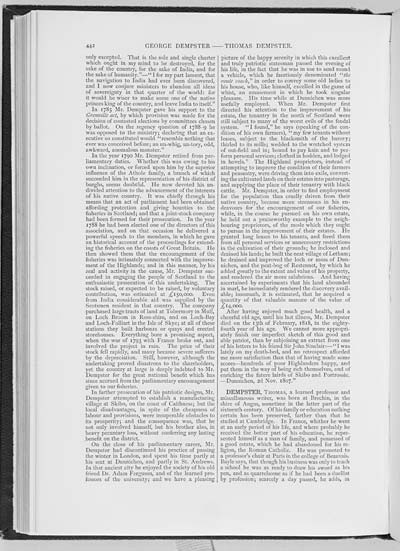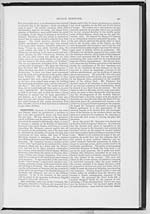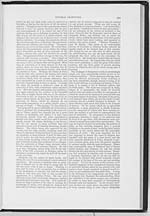442
only excepted. That is the sole and single charter
which ought in my mind to be destroyed, for the
sake of the country, for the sake of India, and for
the sake of humanity."�"I for my part lament, that
the navigation to India had ever been discovered,
and I now conjure ministers to abandon all ideas
of sovereignty in that quarter of the world: for
it would be wiser to make some one of the native
princes king of the country, and leave India to itself."
In 1785 Mr. Dempster gave his support to the
Grenville act, by which provision was made for the
decision of contested elections by committees chosen
by ballot. On the regency question of 1788-9 he
was opposed to the ministry; declaring that an ex-
ecutive so constituted would "resemble nothing that
ever was conceived before; an un-whig, un-tory, odd,
awkward, anomalous monster."
In the year 1790 Mr. Dempster retired from par-
liamentary duties. Whether this was owing to his
own inclination, or forced upon him by the superior
influence of the Athole family, a branch of which
succeeded him in the representation of his district of
burghs, seems doubtful. He now devoted his un-
divided attention to the advancement of the interests
of his native country. It was chiefly through his
means that an act of parliament had been obtained
affording protection and giving bounties to the
fisheries in Scotland; and that a joint-stock company
had been formed for their prosecution. In the year
1788 he had been elected one of the directors of this
association, and on that occasion he delivered a
powerful speech to the members, in which he gave
an historical account of the proceedings for extend-
ing the fisheries on the coasts of Great Britain. He
then showed them that the encouragement of the
fisheries was intimately connected with the improve-
ment of the Highlands; and in this manner, by his
zeal and activity in the cause, Mr. Dempster suc-
ceeded in engaging the people of Scotland to the
enthusiastic prosecution of this undertaking. The
stock raised, or expected to be raised, by voluntary
contribution, was estimated at �150,000. Even
from India considerable aid was supplied by the
Scotsmen resident in that country. The company
purchased large tracts of land at Tobermory in Mull,
on Loch Broom in Ross-shire, and on Loch-Bay
and Loch-Folliart in the Isle of Skye; at all of these
stations they built harbours or quays and erected
storehouses. Everything bore a promising aspect,
when the war of 1793 with France broke out, and
involved the project in ruin. The price of their
stock fell rapidly, and many became severe sufferers
by the depreciation. Still, however, although the
undertaking proved disastrous to the shareholders,
yet the country at large is deeply indebted to Mr.
Dempster for the great national benefit which has
since accrued from the parliamentary encouragement
given to our fisheries.
In farther prosecution of his patriotic designs, Mr.
Dempster attempted to establish a manufacturing
village at Skibo, on the coast of Caithness; but the
local disadvantages, in spite of the cheapness of
labour and provisions, were insuperable obstacles to
its prosperity; and the consequence was, that he
not only involved himself, but his brother also, in
heavy pecuniary loss, without conferring any lasting
benefit on the district.
On the close of his parliamentary career, Mr.
Dempster had discontinued his practice of passing
the winter in London, and spent his time partly at
his seat at Dunnichen, and partly in St. Andrews.
In that ancient city he enjoyed the society of his old
friend Dr. Adam Ferguson, and of the learned pro-
fessors of the university; and we have a pleasing
picture of the happy serenity in which this excellent
and truly patriotic statesman passed the evening of
his life, in the fact that he was in use to send round
a vehicle, which he facetiously denominated "the
route coach," in order to convey some old ladies to
his house, who, like himself, excelled in the game of
whist, an amusement in which he took singular
pleasure. His time while at Dunnichen was more
usefully employed. When Mr. Dempster first
directed his attention to the improvement of his
estate, the tenantry in the north of Scotland were
still subject to many of the worst evils of the feudal
system. "I found," he says (speaking of the con-
dition of his own farmers), " my few tenants without
leases, subject to the blacksmith of the barony;
thirled to its mills; wedded to the wretched system
of out-field and in; bound to pay kain and to per-
form personal services; clothed in hodden, and lodged
in hovels." The Highland proprietors, instead of
attempting to improve the condition of their farmers
and peasantry, were driving them into exile, convert-
ing the cultivated lands on their estates into pasturage,
and supplying the place of their tenantry with black
cattle. Mr. Dempster, in order to find employment
for the population thus cruelly driven from their
native country, became more strenuous in his en-
deavours for the encouragement of our fisheries,
while, in the course he pursued on his own estate,
he held out a praiseworthy example to the neigh-
bouring proprietors, of the mode which they ought
to pursue in the improvement of their estates. He
granted long leases to his tenants, and freed them
from all personal services or unnecessary restrictions
in the cultivation of their grounds; he inclosed and
drained his lands; he built the neat village of Letham;
he drained and improved the loch or moss of Dun-
nichen, and the peat-bog of Restennet, by which he
added greatly to the extent and value of his property,
and rendered the air more salubrious. And having
ascertained by experiments that his land abounded
in marl, he immediately rendered the discovery avail-
able; insomuch, it is estimated, that he acquired a
quantity of that valuable manure of the value of
�14,000.
After having enjoyed much good health, and a
cheerful old age, until his last illness, Mr. Dempster
died on the 13th of February, 1818, in the eighty-
fourth year of Ms age. We cannot more appropri-
ately finish our imperfect sketch of this good and
able patriot, than by subjoining an extract from one
of his letters to his friend Sir John Sinclair:�"I was
lately on my death-bed, and no retrospect afforded
me more satisfaction than that of having made some
scores�hundreds of poor Highlanders happy, and
put them in the way of being rich themselves, and of
enriching the future lairds of Skibo and Portrossie.
�Dunnichen, 2d Nov. 1807."
DEMPSTER, THOMAS, a learned professor and
miscellaneous writer, was born at Brechin, in the
shire of Angus, sometime in the latter part of the
sixteenth century. Of his family or education nothing
certain has been preserved, farther than that he
studied at Cambridge. In France, whither he went
at an early period of his life, and where probably he
received the better part of his education, he repre-
sented himself as a man of family, and possessed of
a good estate, which he had abandoned for his re-
ligion, the Roman Catholic. He was promoted to
a professor's chair at Paris in the college of Beauvais.
Bayle says, that though his business was only to teach
a school he was as ready to draw his sword as his
pen, and as quarrelsome as if he had been a duellist
by profession; scarcely a day passed, he adds, in

![]() Universal Viewer |
Universal Viewer | ![]() Mirador |
Large image | Transcription
Mirador |
Large image | Transcription
![]()

